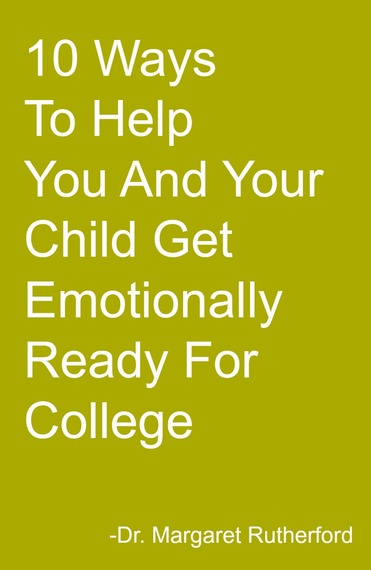I like the commercial where a little girl is sitting behind the wheel of a car, saying "Bye Dad. I'll be okay." Dad watches, carefully hands her the keys. Right before she drives off, we see that she's really 18.
How time can fly.
Now your almost legal child is going to college.
There are lots of wonderful posts about how to get your child ready for college. What they need to take. What they need to know about college itself. What dropping them off will be like.
This post is about how to get yourself prepared -- to let them go.
Maybe they know where they want to go. You've heard them talking about why they want to go there -- what their expectations and hopes are. Or maybe they're a little wishy-washy on the topic. Maybe they've even shared what they're nervous about.
You've also watched them handle countless transitions or hurdles in their young life. She hurt her knee and couldn't play soccer last year, but she desperately wants a college scholarship. His heart was broken by a girlfriend, now he doesn't trust and has big walls up. She was bullied in the 6th grade, so much so that you homeschooled her for a while, and she's on the shy side. He got depressed and angry after your divorce, his grades started dropping, and he smoked pot for a while. She has ADD, which has made school hard, and she takes medication for it. Sometimes, she's been pestered to give some of it to friends -- "so they can study."
You did your best to help them through whatever happened. But now, it's time to watch how they handle things more on their own, and sometimes from many miles away.
If she makes the college soccer team, how will she handle the stress of college and playing sports? How will your son confront how hurt he was and work through it? How will that shy daughter fare in her dorm, surrounded by other people? Will your son be able to stay away from drugs with the added freedom of college? Can your daughter handle the pressure of her ADD with college study, and can she keep saying "no" when she wants to make friends?
If you believe in your child, your child is more likely to believe in themselves.
As a parent, that takes reassuring yourself that you've done a "good enough" job. There have been some high points, some things that you did really well.
You've not been perfect. That's impossible anyway.
Your older teen still has things to learn.
Remember how much you learned in college? Or between the ages of 18 and 25, wherever you were? Were you perfectly equipped to handle what life brought you?
Of course not.
What's hard about letting go? You lose the power of immediacy. You can't eyeball your teen.
You will no longer have a front row seat in their daily life.
"Lily wants to come home again this weekend. Is she making any friends?"
"He never texts back. Did I raise a thoughtless jerk?"
"Janie said that her daughter is studying all the time. Megan never talks about her classes. Is she even going?"
It's hard to handle the not knowing.
Here are 10 ways to reassure yourself and set appropriate boundaries.
1) Focus on things you know your teen knows. Write them down. Recognize how you taught them well.
2) Don't assume that you've caused whatever problem there is. It's likely not about you at all.
3) If you're texting or calling all the time, you could be an issue. You're getting in the way.
4) If they're struggling with something, remind them of their strengths -- other transitions or hurdles they've gotten through. But don't solve the problem for them.
5) Ask if they'd like your advice. If they don't, wait and see how they handle things.
6) Begin finding things in your own life that lend purpose to it. If that's hard, then you might need professional help to work your way through those feelings.
7) Know you might feel sad at times, or relief, or a new sense of freedom. All of that is normal.
8) Decide with your teen what appropriate expectations are -- prior to dropping him off. If a grade point average drops too low, if they're losing a lot of weight, if they've got huge dark circles under their eyes or are sick all the time, something could be wrong. Agree to tangible things that they can understand. If they're seeming to get lost, then you might have to act, after you give them the chance to address the problem.
9) You may have a fantasy of what your child's college life is going to be. If you do, that can feel like immense pressure on your child. Be honest with yourself; you may have to give up those expectations. Let her be who she is becoming, and get to know her.
10) Be aware that mental illness can emerge during these years, or can be triggered by the stress of college. If it runs in your family, make sure your child knows about it, and provide information about it. They may not appear to listen, but hopefully it will sink in.
Watch for signs that the normal stresses of college aren't deepening into an illness, while realizing that your teen will go through stages of development.
It's a balancing act. But worry will get you nowhere.
You can read more of Dr. Margaret on her website. You can receive a free copy of her eBook, "Seven Commandments of Good Therapy" as well!
Earlier on Huff/Post50:


